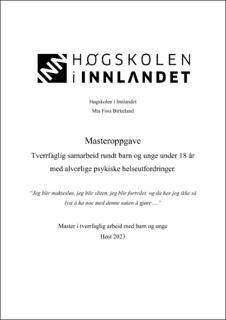| dc.contributor.advisor | | |
| dc.contributor.author | Mia Foss Birkeland | |
| dc.date.accessioned | 2023-11-25T17:10:22Z | |
| dc.date.available | 2023-11-25T17:10:22Z | |
| dc.date.issued | 2023 | |
| dc.identifier | no.inn:inspera:164568704:53579834 | |
| dc.identifier.uri | https://hdl.handle.net/11250/3104650 | |
| dc.description.abstract | Folkehelseinstituttet og Ungdata viser til at det stadig står dårligere til med den psykiske helsen til barn og unge. Med jevne mellomrom beskriver media det økende omfanget av psykisk syke barn og unge, samt utfordringer og svakheter knyttet til måten hjelpeapparatet hjelper denne gruppen barn og unge. Jeg ønsket å undersøke ansatte i barne- og ungdomspsykiatrien, barnevernet og politiets erfaringer knyttet til samarbeid rundt barn og unge under 18 år med alvorlige psykiske helseutfordringer. Dette har jeg gjort ved hjelp av intervjuer med fokus på informantenes personlige opplevelser, meninger og erfaringer. Da rekrutteringsprosessen raskt viste seg å være langt vanskeligere enn hva jeg hadde sett for meg, besluttet jeg å endre formen på de planlagte intervjuene fra fokusgruppeintervjuer til intervjuer bestående av to deltakere fra samme tjeneste. Jeg intervjuet totalt 8 personer, hvor to av informantene var rekruttert fra barnevernets førstelinjetjeneste, to fra det statlige barnevernet, to fra politiet og de to siste fra barne- og ungdomspsykiatrien.
Funnene i min studie kan tyde på at informantene fra de representerte tjenestene kan oppleve en frykt for å “gjøre feil” i arbeidet med barn og unge med psykiske helseutfordringer. Videre kan det synes som om ansatte sikrer seg eller “gjemmer” seg bak lovverket for å unngå at de ender opp som “syndebukk”. Dette som følge av tidligere erfaringer og utfall, som ser ut til å påvirke deres veivalg videre. Som følge av redselen for å gjøre noe feil, eller ende opp som “syndebukk”, uttalte flere informantene at dette kan bidra til både manglende samhandling og iverksettelse av tiltak som ikke er “barnets beste”. Et annet sentralt moment som gikk igjen var taushetsplikten og hvordan ulik praktisering av denne påvirket samhandling mellom de ulike tjenestene.
Videre oppga informantene ulike årsaker til at barn og unge med psykiske helseutfordringer faller mellom flere stoler i hjelpeapparatet. Organiseringen av hjelpen beskrives som fragmentert. Manglende rolleavklaring, organisatoriske rammer, mandat, ansvarsområder og perspektiv ble trukket frem som faktorer som gjør det tverrfaglige samarbeidet utfordrende.
I tillegg gav informantene uttrykk for at tidspress, ressursmangel og ulike prioriteringer påvirker både samarbeidet mellom tjenestene, og kvaliteten på hjelpen som ytes til barn og unge med alvorlige psykiske helseutfordringer. Manglende tid, kapasitet og ressurser synes å medføre et ønske om å dytte ansvaret over til noen andre. Det resulterer i at barna blir kasteballer mellom etatene. Bruk av ulike mestringsstrategier for å redusere gapet mellom tildelte ressurser og oppgaver gjennom “creaming” eller siling av klienter, samt mental distansering kan også føre til at barn og unge opplever å bli kasteballer mellom tjenestene. | |
| dc.description.abstract | The Norwegian Institute of Public Health and Ungdata refer to the worsening state of mental health among children and young people. Media periodically depict the increasing prevalence of mental health issues in children and young individuals, along with challenges and weaknesses in how the support system aids this group. I aimed to investigate the experiences of professionals in child and adolescent psychiatry, child welfare, and the police in relation to collaboration concerning individuals under 18 years of age facing serious mental health challenges. I accomplished this through interviews focused on the informants personal experiences, opinions, and insights. As the recruitment process proved to be much more challenging than anticipated, I decided to alter the format of the planned interviews from focus group interviews to interviews involving two participants from the same service. I interviewed a total of 8 individuals, with two informants recruited from the child welfare frontline service, two from the state child welfare, two from the police, and finally two from the child and adolescent psychiatry service.
The findings of my study suggest that informants from the represented services may experience a fear of “making mistakes” in their work with children and young people facing mental health challenges. Furthermore, it seems that employees safeguard themselves or “hide” behind legal frameworks to avoid becoming the “scapegoat”. This stems from previous experiences and outcomes that appear to influence their subsequent choices. Due to the fear of making errors or becoming the “scapegoat”, several informants stated that this could contribute to both a lack of collaboration and the implementation of measures that are not the “best interest of the child”. Another recurring theme was confidentiality and how different interpretations of it influenced collaboration among the various services.
Furthermore, informants cited various reasons why children and young with serious mental health challenges fall between two stools in the support system. The organization of assistance is described as fragmented. Lack of role clarification, organizational frameworks, mandates, responsibilities, and perspectives were highlighted as factors making interdisciplinary collaboration challenging.
Additionally, informants expressed that time constraints, lack of resources, and differing priorities impact both collaboration between services and the quality of assistance provided to children and young individuals with serious mental health challenges. Insufficient time, capacity, and resources seem to lead to a desire to shift responsibility onto others. This results in the children being bounced between agencies. The use of various coping strategies to bridge the gap between allocated resources and tasks through “creaming” or screening of clients, as well as mental distancing, can also lead to children and young people being pushed from pillar to post. | |
| dc.language | nob | |
| dc.publisher | Inland Norway University | |
| dc.title | Tverrfaglig samarbeid rundt barn og unge under 18 år med alvorlige psykiske helseutfordringer. | |
| dc.type | Master thesis | |
